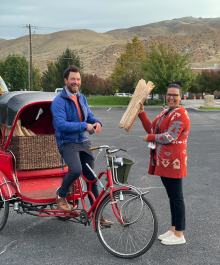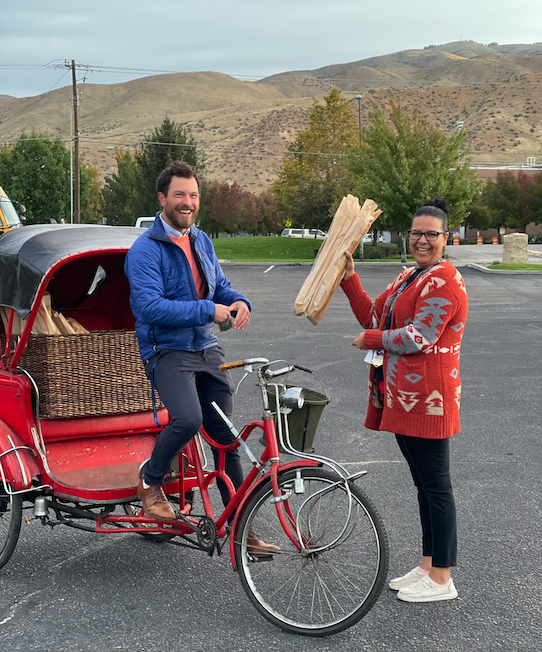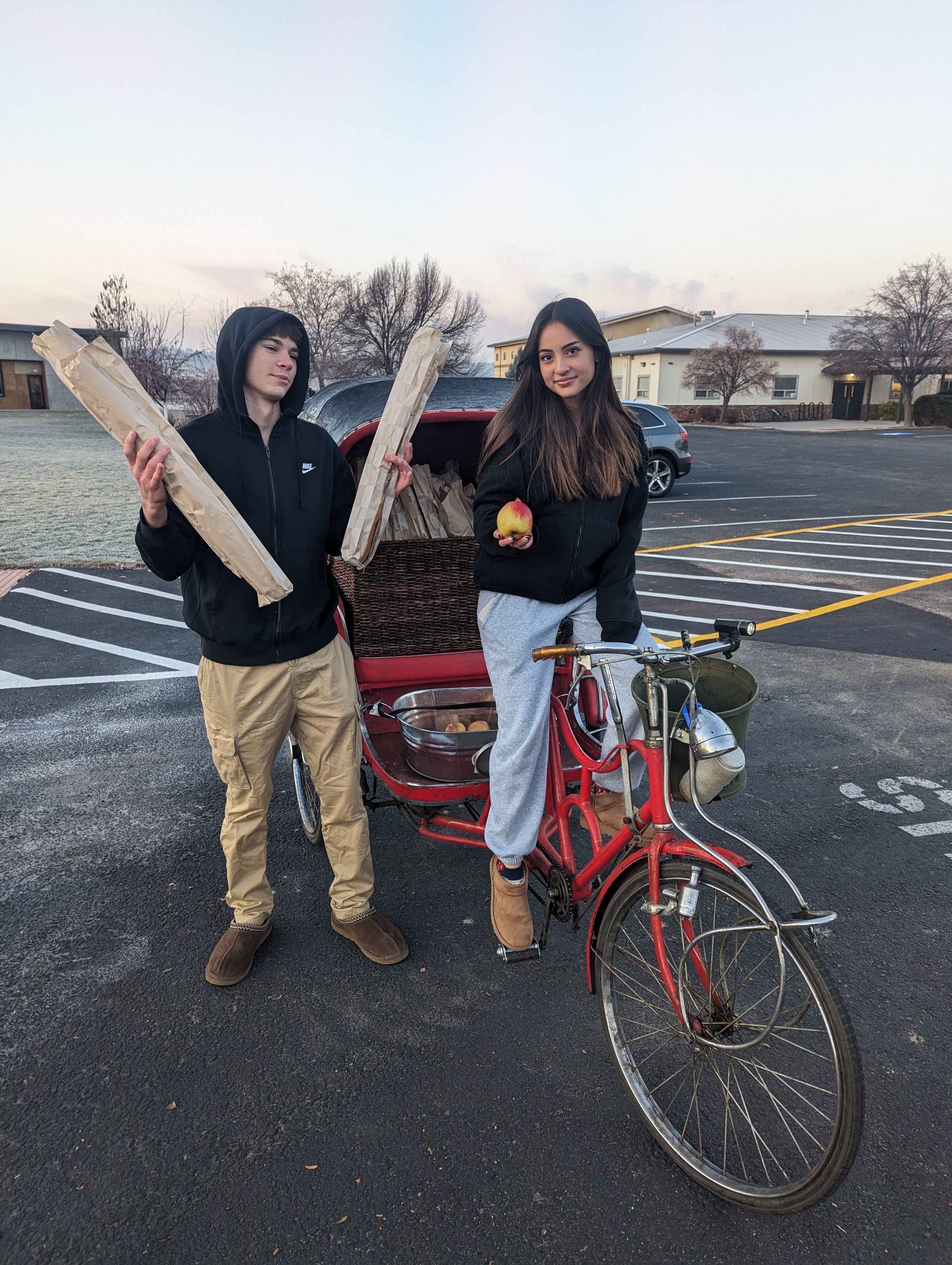
The following article was written by Brett Lofgren, MYP English Teacher.
If you’ve seen me riding around campus on Wednesday morning with a Taiwanese Pedicab full of baguettes, then you probably have asked some variety of the same question: “What’s the deal with the bread?” Our official mission statement for The Riverstone Pedicab is to build community, or more specifically, “International schools have a responsibility to build local communities.” I moved here from South Korea in the summer of 2022 after teaching at international schools for four years. While abroad, I found that the people I connected with most frequently were those surrounding the international school at which I taught: my fellow teachers were my friends, the students would teach me about local customs as much as I taught them about Lord of the Flies and when my children were invited to their classmates’ birthday parties, I would attend and chat with their parents. While I definitely socialized and explored life outside of the school setting, my school was the center of my community. Perhaps the purest form of inspiration for this business venture was that after eating thousands of delicious East Asian dishes, I missed eating western style bread.
Fast forward to the end of my first year at Riverstone and you would see the Middle School Director, Damon Brown, and I opening a storage container to look at the three wheeled behemoth we now affectionately call The Riverstone Pedicab. Donated by the previous head of school, we knew we were looking at something valuable. We just didn’t know what to do with it. Damon told me he could fix it up, but to what purpose? Around the same time, I had baked bread with the class of 2025 and their English teacher, Ms. Shey, as a Wednesday field experience. We watched an episode of Michael Pollen’s Cooked– in which he explores the history of bread and its role in building community– and took a field trip to Gaston’s Bakery on The Boise Bench. Over the summer, a few ideas would coalesce and in the fall of 2023, we put together our business strategy.
We would start with a soft open. I would order 25 baguettes to be delivered to the school one Wednesday morning and we’d see if they’d sell for $5 each. If it was popular, we’d figure out what to do from there. With minimal advertisement, and some sunrise silliness, I found myself blaring Edith Piaf through a portable speaker and riding a giant bicycle through the parking lot. The smiles and excitement we saw that first morning, paired with the genuine laughter at seeing something so unusual in Boise, let us know that we had caught on to something special. We also sold out in 15 minutes.

From that initial baguette sale, we slowly expanded to 30 baguettes, then 45 and now we frequently sell out with a giant basket full of 60 baguettes. We also started giving away roughly 40 apples a week to supplement a bread-fueled breakfast and offer something to students who didn’t bring money. In an attempt to further our community and charity goals, clubs from the Middle Years and Diploma Programs now help operate the pedicab, resulting in $100 for their organization each morning service they volunteer. It’s hard to explain the mixture of nerves, excitement and joy students and I feel when riding up on that giant bicycle seat. The first sale, the joyous music, the laughter from a cheesy joke, and influx of cash quickly overshadow student worries about the strain of getting up early and pushing the heavy pedals through a dark parking lot.

While it might be tempting to establish a narrative that this strange pedicab experience kind of fell into place with a series of lucky coincidences, I assure you that each step along the way has been intentionally based on academic research and data. Administrators across all three divisions report that Wednesday attendance is improved in the elementary, middle and high schools. Additionally, there is a longstanding cultural saying that “Breakfast is the most important meal of the day,” and that applies to students as those that eat breakfast show higher academic achievement. Famous food journalist Michael Pollen reports:
“People who eat a lot of processed food struggle more with health problems. So we look at what’s present and absent from processed foods to understand where they went wrong, why they make people sick. Take bread, one of my own favorite foods. It’s made from a few basic ingredients: flour, water, yeast and salt. Which you mix together, let rise, and then eventually bake. We’ve been eating it for thousands of years. But the bread our ancestors ate was very different from what you find in most supermarkets today.”
After visiting Gaston’s bakery, where we get our baguettes, I recognized that they’re using quality ingredients that are associated with improved health outcomes. They use the highest quality, local flour and a “UNIFINE mill that pulverizes the wheat on impact, producing a high-quality, high-extraction, nutritious flour. Instead of over-processing and diluting the wheat germ, the impact mill process maintains the integrity of the flour, providing more fiber and flavor.” If it’s superlatives you’re looking for, Food & Wine Magazine proudly claims that Gaston’s is the best bread in Idaho.
In all of the chaos of being a teacher, a father and a husband, I find myself–somehow– a volunteer food-cart vendor. Despite being a Grade 9 & 10 English teacher, when I walk through the elementary school, students see me and cry out “There’s Mr. Baguette.” Occasionally, I have left over apples in my room that I give out to students and I’ll get some who wander in on Wednesday afternoons just to see if I have any left over. Schools operate outside of typical business practices, allowing our small charity to fundamentally prioritize community connections over profits.
The hardest part of operating the pedicab has been figuring out why we’re doing it and matching our actions to how we answer that question. Each time I’ve had a difficult decision, I’ve looked at a few simple tenants: does it build community? Is it healthy for students? Are we keeping this simple and straightforward? I am a teacher, not an entrepreneur, after all. One example of how this orientation has influenced the pedicab is that we only accept cash. While our profits would likely increase with Venmo or CashApp, we would lose the nervous look on a 1st grader’s face when they turn to a high school student astride a giant bicycle and hand over $10, asking for change. We would lose the numeracy skills that the same high schooler needs to understand when a parent walks up and asks if they have change for $100. Think about what must go through that 10th graders brain when they look at a bucket of crumpled up one, five, ten and twenty dollar bills; they need to quickly estimate if that bundle of cash is greater than $95 and that’s not easy for students who may rarely handle cash.
Shortly before Damon showed me the bike, I read Yvonne Chouinard’s book Let My People Go Surfing, a text about work-life balance, sustainable business practices, the art of design and charity. I’ve reflected on the text as our business has grown: it’s helped build my confidence in this venture and orient me towards sustainability and quality. Fundamentally, we must confidently prioritize that we, as an international school, have a responsibility to build both global and local communities.


.png&command_2=resize&height_2=85)

















